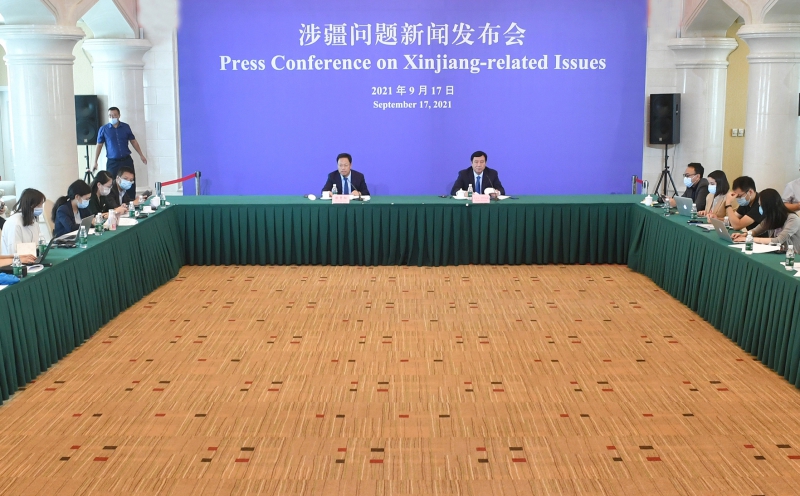
Photo taken on September 17, 2021 shows the 55th Press Conference on Xinjiang-related Issues in Beijing. Photo by Xinjiang Daily/ Zou Yi
Xu Guixiang: Good morning, media friends. Welcome to the press conference on Xinjiang related issues of Xinjiang Uygur Autonomous Region. I’m Xu Guixiang, spokesman of the Government of Xinjiang Uygur Autonomous Region. This is Mr. Elijan Anayat, another spokesman of the Government of Xinjiang Uygur Autonomous Region.
Next, I’m going to make some remarks on the contents of today’s conference.
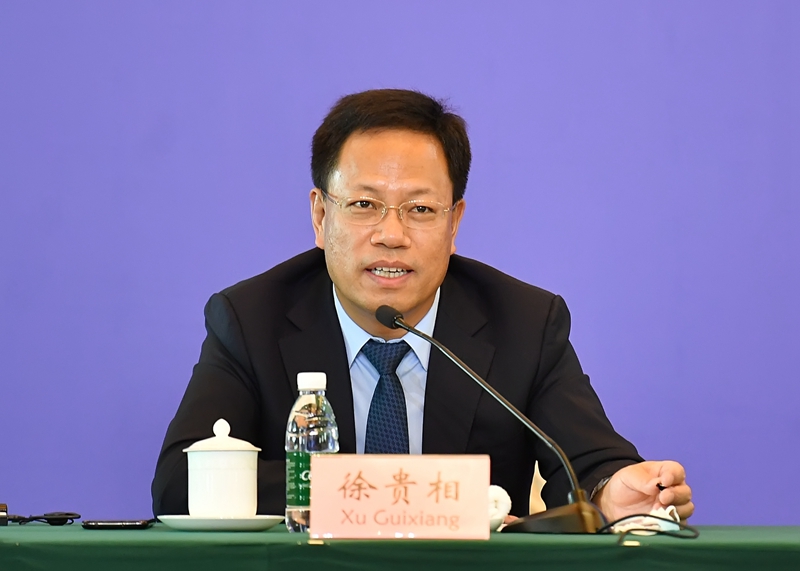
Photo taken on September 17, 2021 shows Xu Guixiang, spokesman of People’s Government of Xinjiang Uygur Autonomous Region speaks at the 55th Press Conference on Xinjiang-related Issues in Beijing. Photo by Xinjiang Daily/ Zou Yi
In recent days, the so-called “Uygur tribunal” conducted the second round of “hearing”, and some so-called “witnesses” staged a farce, which exposed the ugly nature of this “fake tribunal” again.
The so-called “Uygur tribunal” is full of false lies. Some of the so-called “witnesses” they solicited borrowed the flag of human rights, some dressed themselves in academic garment, and some made up their own experiences. They seemed to be true and credible, but in fact they deceived the world. For example, Halimat Rozi, who testified in the “court”, left China as early as 2006 and is a core member of the Japanese Uygur Association. He said in the “court” that “his brother seems to have been detained by Chinese government agents”. He was lying. According to investigation, none of his immediate family members in Xinjiang has ever been detained. Instead, they are working and living normally. For example, his eldest brother, Ye’erken Rouzi, is an official of Tax Bureau of Tacheng Prefecture, Xinjiang. Now, let’s watch a video clip and see what he says.
Through this video, I believe you have a more direct understanding of the hypocrisy of the “hearing” and “witness and testimony”.
There is a saying in Xinjiang: “Lying can’t hide from the local people”. Those who have suffered the heavy disaster of violent terrorist attacks, those who have acquired a new lease of life in the vocational education and training center, those cotton farmers who are busy in the fields, those students’ parents who enjoy the preferential education policy of boarding system, those religious believers who fully enjoy the freedom of religious belief, those who travel everywhere to work and do business, and those trustees of excellent ethnic culture and art who are doing their job for the development of ethnic culture and art, are all creating a happy life with their own hands, depicting a beautiful future and telling their own moving stories. They live and work in Xinjiang and have deep understanding about Xinjiang. They are the most trustworthy and persuasive witnesses and have the most say in Xinjiang.
In today’s press conference on Xinjiang related issues, we will span thousands of kilometers of Tianshan Mountain and connect 24 ordinary people in the grass-roots of Xinjiang by means of online video, asking them to tell their own experiences and stories. Let’s listen to their voices.
Xu Guixiang: On counter-terrorism. What achievements have been made in counter-terrorism and stability maintenance in Xinjiang? Next, we will connect the local people from Urumqi, Aksu, Hotan, Kizilsu Kirgiz Autonomous Prefecture and other regions via online video and listen to what they say.
First, let’s watch a video clip on the “5.22” serious terrorist attack at Park North Street in Urumqi on May 22, 2014.
Xu Guixiang: What is today’s Park North Street like? Now let’s connect Wei Yuxi, a resident near Park North Street in Urumqi by means of online video.
Hello, Ms. Wei Yuxi. We are holding a press conference on Xinjiang related issues in Beijing. We know that there has been a serious violent and terrorist attack at Park North Street, Urumqi. What’s the situation now? Please share with us what you know.
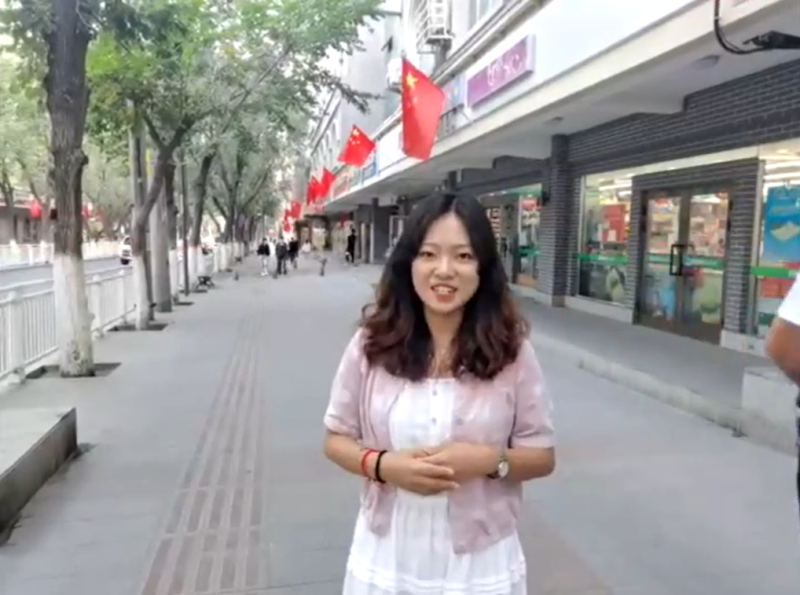
Photo taken on September 17, 2021 shows Wei Yuxi speaks at the 55th Press Conference on Xinjiang-related Issues in Beijing via online video. Photo by Xinjiang Daily/ Zou Yi
Wei Yuxi: I’m Wei Yuxi. I am a resident living near Park North Street in Urumqi. People who have heard of the “5.22” serious terrorist attack at Park North Street in Urumqi may instantly think of that violent terrorist attack as soon as they hear the name of Park North Street. However, if you visit this place again today, your feeling will be quite different from what you have imagined. Now the street has been paved again. The original two-way road has been changed to one-way road. Neat and uniform safety barriers have been installed on both sides of the street, and pedestrians are completely separated from vehicles, which makes the street much safer. Trees are lined on both sides of the road and along the street there are all kinds of businesses, including restaurants, dress shops, and other shops.
Today’s Park North Street is also the most familiar street of delicacies for Urumqi citizens. It is crowded with large and small restaurants, most of which feature Xinjiang cuisine and some of which characterize exotic dishes. When night falls, the street is dimly lit and has a unique temperament. “Bar street” is also located here, attracting young people to punch in at the bar and enjoy a colorful nightlife. People living here can deeply feel the stability and peace brought by counter-terrorism and stability maintenance.
Xu Guixiang: Now let’s connect Yao Tao, leader of the village team in Yekeli village, Ying’airike Town, Awati County, Aksu Prefecture via online video.
Hello, Yao Tao. We are holding a press conference on Xinjiang related issues in Beijing. Please share with us your work experience in the village.
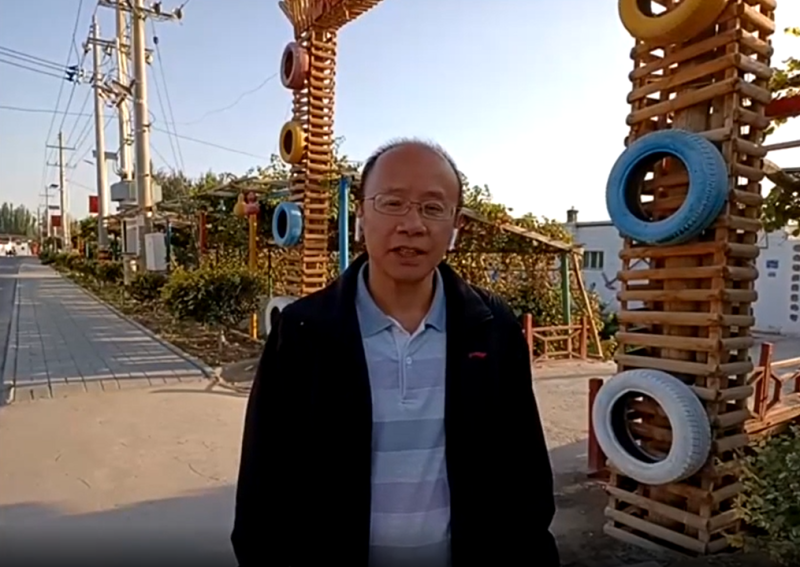
Photo taken on September 17, 2021 shows Yao Tao speaks at the 55th Press Conference on Xinjiang-related Issues in Beijing via online video. Photo by Xinjiang Daily/ Zou Yi
Yao Tao: Hello, my name is Yao Tao. I am the leader of the village team appointed by the Department of Culture And Tourism of Xinjiang Uygur Autonomous Region to work in Yekeli Village, Ying’airike Town, Awati county. Some people outside China say that our task force “surveil ethnic minorities”. It is completely a slander.
We started our work in Yekeli Village in 2014. At that time, the villagers in Yekeli Village had very conservative mindset. They were stricken with poor income, low crop output and the lack of good sales channels. The per capita income was only about 2800 yuan. Since our work team arrived, we have actively striven for poverty alleviation projects of cattle and sheep, vigorously developed animal husbandry, established cooperatives, and formed a business model of “cattle and sheep trusteeship” and “villagers’ dividend”. At the same time, we invited local and county agricultural experts to give lectures and carry out technological assistance. In recent years, the output and quality of agricultural products such as cotton, walnut and corn in our village have been greatly improved, and the per capita income also increased to 14600 yuan in 2020.
In order to further improve the villagers’ happiness index, we have built two sidewalks on the main road of the village, repaired the greenery belt, installed solar street lamps, built a grape corridor at the gate of the villagers’ house, and painted beautiful farmers’ paintings on the walls along the street. The improvement of the appearance of the village makes the villagers of our village more confident. When they go to bazaar in the county and township, they often proudly tell other people “I’m a villager of Yekeli Village”.
I have also invited Aizezijiang Younusi, a villager of our village, to introduce the changes in the village in recent years.
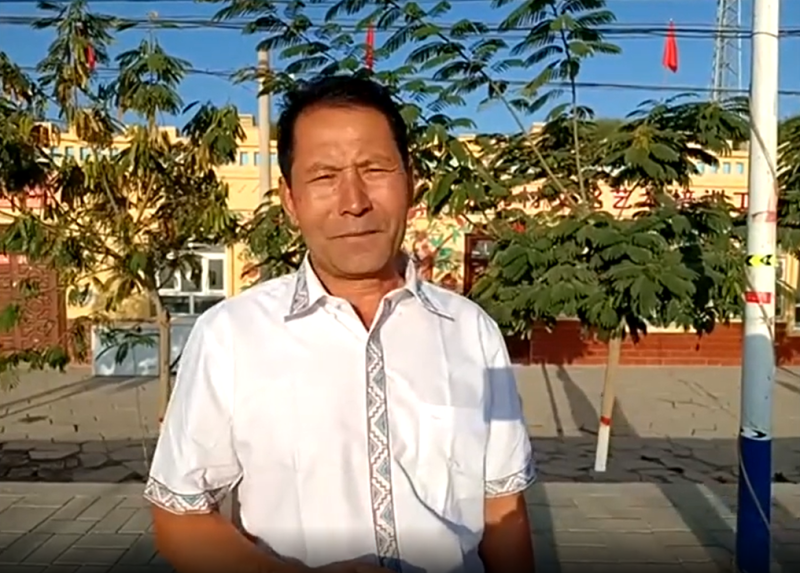
Photo taken on September 17, 2021 shows Aizezijiang Younusi speaks at the 55th Press Conference on Xinjiang-related Issues in Beijing via online video. Photo by Xinjiang Daily/ Zou Yi
Aizezijiang Younusi: Hello, my name is Aizezijiang Younusi. Our life has changed a lot in recent years. In the past, our family only had two or three mu of farmland, with a relatively low income and a tight life. Through continuous efforts in recent years, our family now has 18 mu of farmland, 5 cattle and 15 sheep. Our family also bought a car last year. In 2020, the village team planed to set up a “ town of cultural tourism ”, I’m very interested and want to participate actively. After learning my wish, the work team helped me come up with many good ideas. They also helped me to apply for projectors, speakers, musical instruments and painting supplies etc.. With their help, my family set up a cultural courtyard. Now our yard is bustling with joy and excitement every night. After dinner in the evening, the villagers come to our house to see movies, sing and dance. Sometimes foreign tourists visit our house to feel the local culture of our village. Our village has good living conditions and beautiful environment, and the villagers are hospitable. You are welcome to visit our village.
Xu Guixiang: Now let’s connect Wang Wei, the head of convenience police station at Xinjiang International Bazaar via online video.
Hello, Wang Wei. We are holding a press conference on Xinjiang related issues in Beijing. Please tell us about your convenience police station.
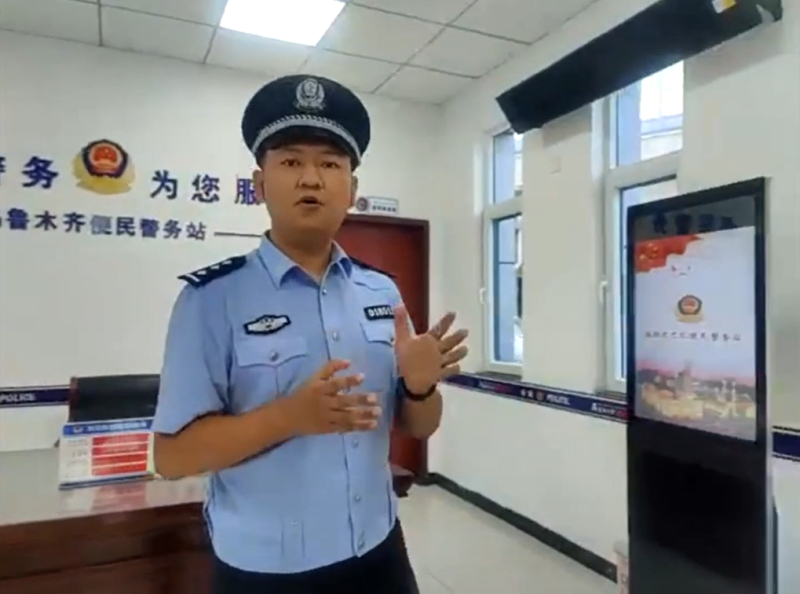
Photo taken on September 17, 2021 shows Wang Wei speaks at the 55th Press Conference on Xinjiang-related Issues in Beijing via online video. Photo by Xinjiang Daily/ Zou Yi
Wang Wei: Hello, I’m Wang Wei, the head of convenience police station at Xinjiang International Bazaar. Some people outside China said that the establishment of convenience police stations is “excessive counter-terrorism”. Their claim is completely wrong.
Now let me introduce to you the functions of our convenience police station. This is our convenience service hall. We have set up 38 kinds of convenience service facilities and equipment in the hall, which are provided to the masses for free 24 hours a day. This is a convenient charging station. If your mobile phone or camera is out of power, you can come to the police station for free charging. This is an umbrella rack. In case of rain and snow, we provide umbrellas for the masses. We have wheelchairs and stretchers for people with mobility difficulties. This is the rest area. When the people are tired and thirsty, they can go to the police station to rest, drink water and read newspapers and books. This is a business inquiry machine. People of all ethnic groups can easily and quickly query the relevant business they need to handle. This is our convenience service cabinet. There are some common convenience items in it, including magnifying glass, reading glasses, needle and thread box, etc.
According to incomplete statistics, since the establishment of the station, it has served more than 32000 people of all ethnic groups, giving full play to the role of bringing warmth to the people as a window for the people. When people are in need of help, the first place they immediately turn to for help is convenience police station. This is the basic information of the convenience police station. Thank you!
Xu Guixiang: Now let’s connect Mr.Tuohetitumir, Head of Bostan Street office, Moyu County, Hotan Prefecture via online video.
Hello, Mr. Turefu Tuohetitumir. We are holding a press conference on Xinjiang related issues in Beijing. Some people abroad falsely claimed that 311 people in Bostan street, Moyu county were “detained in the vocational education and training center”. What is the real situation? Please tell us about it.
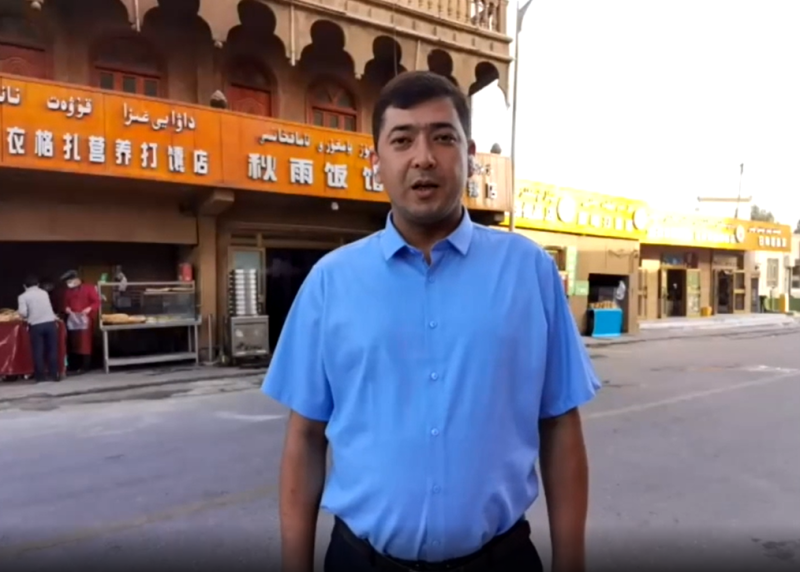
Photo taken on September 17, 2021 shows Turefu Tuohetitumir speaks at the 55th Press Conference on Xinjiang-related Issues in Beijing via online video. Photo by Xinjiang Daily/ Zou Yi
Turefu Tuohetitumir: Hello, my name is Turefu Tuohetitumir. I am the head of of Bostan Street office, Moyu County, Hotan Prefecture. Some people abroad falsely claimed that 311 people in our street were “detained in the vocational education and training center”. It is a complete lie. Most of the 311 people listed by them are residents of our Bostan street. They have been working and living normally in society and have never participated in vocational education and training.
Xu Guixiang: Now, let’s shift our attention to northern Xinjiang and connect Kuduzi Tu’ersunmaimaiti, a guide of Kazanqi Folk Custom Tourism Site in Yining City via online video.
Hello, Ms. Kuduzi Tu’ersunmaimaiti. We are holding a press conference on Xinjiang related issues in Beijing. You are welcome to attend the press conference. Please introduce Kazanqi to us.
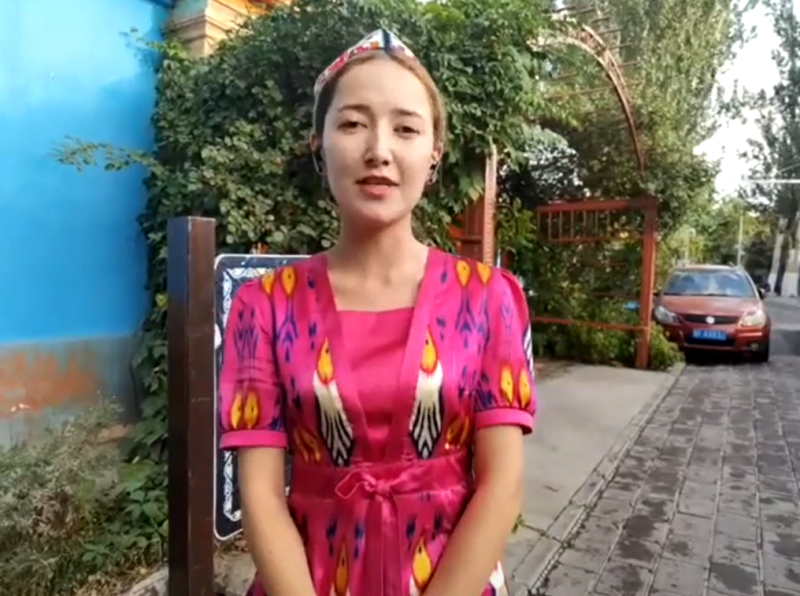
Photo taken on September 17, 2021 shows Kuduzi Tu’ersunmaimaiti speaks at the 55th Press Conference on Xinjiang-related Issues in Beijing via online video. Photo by Xinjiang Daily/ Zou Yi
Kuduzi Tu’ersunmaimaiti: Hello, everyone. My name is Kuduzi Tu’ersunmaimaiti. I am a guide of Kazanqi Folk Custom Tourism Site in Yining City, Ili Kazak Autonomous Prefecture, Xinjiang. Some people outside China call “Xinjiang is an open-air prison”. It is a vicious attack.
I have lived here since I was a child. I know everything here very well and have witnessed the great changes here. When I was a child, Kazanqi did not have such a good environment, and the life of residents was very inconvenient. In the past, there was no tap water and sewer. Every family used that kind of dry toilet, which was very unsanitary. On rainy days, the road became muddy and it is particularly inconvenient to travel. In 2007, in order to improve the living conditions and living environment of residents in Kazanqi, the government invested a lot of human, material and financial resources. While retaining the original architectural style and pattern, the government carried out continuous protective transformation of the old urban area of Kazanqi, resulting in earth shaking changes. The old dirt roads have become asphalt roads, and the gray clay walls have been covered with new clothes. Every household has a flush toilet, tap water, lighting and greenery. The residents living here also have a happy smile on their faces.
In recent years, with the vigorous implementation of the strategy of “rejuvenating Xinjiang through tourism”, Kazanqi has also taken advantage of the profit of tourism to have rapidly developed itself into a national 4A scenic spot, and Qianjin Street, the main street, is also included into the first batch of Chinese historic and cultural blocks. The shops along the street specialize in carpets, leather goods, paintings and other traditional handicrafts of ethnic minorities, featuring strong ethnic style.
What is most attractive in Kazanqi is the characteristic folk houses of 100 years. After the weathering of a century, They still maintain a relatively complete traditional style and pattern. The courtyard we see now is a century old residence. It’s exterior wall is blue and its roof is red, which forms a strong visual contrast and is very fascinating. There are flowers, vegetables and grape racks in the yard. You can enjoy the cool air and the flowers and drink tea in the yard at ordinary times. The floor of the rooms in the house are covered with flowery carpets with ethnic style, and all kinds of delicious dried fruits are placed on the table. When guests come, they sit on the floor, and singing and chatting together. What a fee and comfortable life! Tourists from all over the country like to come here to enjoy tea, delicious food, and singing and dancing. They take photos and feel the strong ethnic characteristics.
In Xinjiang, there are countless ethnic characteristic structures like those in Kazanqi, which are continuously inherited and developed under the protection of the government. However, anti-China forces in the United States and the west slander Xinjiang, claiming that Xinjiang suppresses ethnic minorities and erase ethnic minority culture in Xinjiang. I want to tell them that no matter how they spread rumors and slanders, the ethnic buildings in Xinjiang are still shining there. The lies they made up are a big joke to us in Xinjiang.
Xu Guixiang: What are the facts about vocational education and training? Now, let’s connect the graduates of vocational education and training center and the heads of relevant units showed on satellite image via online video.
First of all, let’s connect Mr. Abudusaimi Abudumijiti, a graduate of the former vocational education and training center in Kashgar City, Kashgar Prefecture.
Hello, Mr. Abudusaimi Abudumijiti. We are holding a press conference on Xinjiang related issues in Beijing. Some people abroad falsely called the vocational education and training center in Xinjiang a “concentration camp”, and falsely claimed that “male trainees were subjected to torture” and “female trainees were subjected sexual assault”. What do you think of this?

Photo taken on September 17, 2021 shows Abudusaimi Abudumijiti speaks at the 55th Press Conference on Xinjiang-related Issues in Beijing via online video. Photo by Xinjiang Daily/ Zou Yi
Abudusaimi Abudumijiti: My name is Abudusaimi Abudumijit. I am a graduate of the former vocational education and training center in Kashgar City, Kashgar Prefecture, Xinjiang. Now I am the deputy general manager of Kashgar Fumama Food Co., Ltd. Some people abroad falsely called the vocational education and training center in Xinjiang a “concentration camp”, and falsely claimed that “male trainees were subjected to torture” and “female trainees were subjected sexual assault”. It is sheer nonsense.
I used to work in the area of environmental protection. A few years ago, when I attended a friend’s wedding, I met some people with extreme ideas. They often took me to private parties and I listened to violent and terrorist audio and watched violent and terrorist video. They said to me, “don’t do business with the Han people. They are not halal.” “Muslims should act according to the religious rules and teachings and should not obey the national laws.” “Real Muslims should draw a line with non Muslims.” “non Muslims are pagans and Muslims can’t use what they produce.” I believed them and acted according to their “standards”. I refused to communicate with the Han people and did not do business with the Han people. When the Han people came to the store, I showed my hatred to them. The business of my store went from bad to worse and I became very grumpy. Once, a good friend of mine advised me not to associate with those people, telling me that this would ruin my life. I was very unhappy with my friend’s advice. I cursed him, “you are a ‘pagan’ and don’t deserve to be my friend. Don’t contact me again.” My parents were very worried about my behavior and afraid that I would be reduced into a criminal in the future. After their persuasion for many times, I went to the vocational education and training center in 2018.
In the vocational education and training center, I learned laws and regulations, as well as national policies on religion and religious knowledge. I gradually learned what real Islam is and recognized the ugly faces of those so-called “friends”. The vocational education and training center also offered a number of courses on computer and tourists’ guide. Each student can study according to their own interests. I chose e-commerce course in hope of improving my business management ability. The living conditions of the vocational education and training center were very good. Our dormitory had TV, electric fan and bathroom. It was warm in winter and cool in summer. The vocational education and training center respected our customs and provides us with halal meals every day. There was a clinic in the vocational education and training center. Doctors gave us diagnosis and treatment at any time when we caught a cold or headache or didn’t feel well. In the vocational education and training center, we could ask for leave when it is necessary. We could rest normally on Saturday, Sunday and national legal holidays. During holidays, religious students could participate in normal religious activities in mosques or at home.
After graduation, I had the idea of starting a food company. After market research, I found that fried chili jam has great development space in Kashgar. With the support of community cadres and my parents, I founded Fumama Food Co., Ltd. jointly with several friends. Our company mainly produces and sells fried chili jam and all kinds of Naan. Look, this is our Fumama fried chili jam, which is processed according to our traditional technology. It is rich in color, mellow in aroma and taste and tastes very refreshing. This is our nutritional Naan which has a wide range in variety, including walnut Nang, Badam Naan, rose jam Naan and spicy Nang. But the most distinctive one is the spicy fried Naan. The spicy fried Naan tastes very good and crisp. I myself also like it very much. The sales is also the best of our products. With the sales growing and orders increasing continuously, I am full of confidence in the future development of our company. Now, our company is getting bigger and stronger and have 18 employees. They have all signed a labor contract, and their salary is between 2500 yuan and 5000 yuan. As one of the shareholders of the company, my annual income reaches 160000 yuan.
My life has changed a lot since I graduated from the vocational education and training center. I bought a new apartment and changed a new car. Now my parents always talk with people around us about my work with pride. Look, this is a happy moment of our family. This is the new apartment I bought. The decoration has been over and I will move into it very soon. This is my car and so far I have not got a pretty girlfriend. I often think that if the vocational education and training center had not pulled me out of the quagmire of religious extremism, I might have been reduced into a criminal. Without the vocational education and training center, I would not have a happy life now.
Xu Guixiang: Some people abroad falsely claim that 380 “detention camps” have been built in Xinjiang through satellite images. Is this really the case?
First, let’s take a look at these pictures.
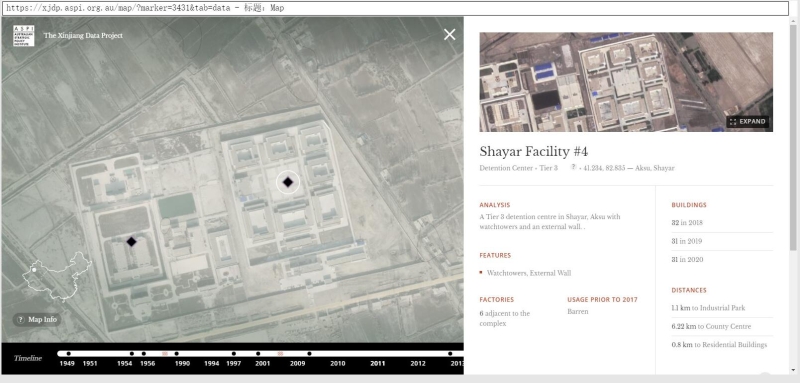
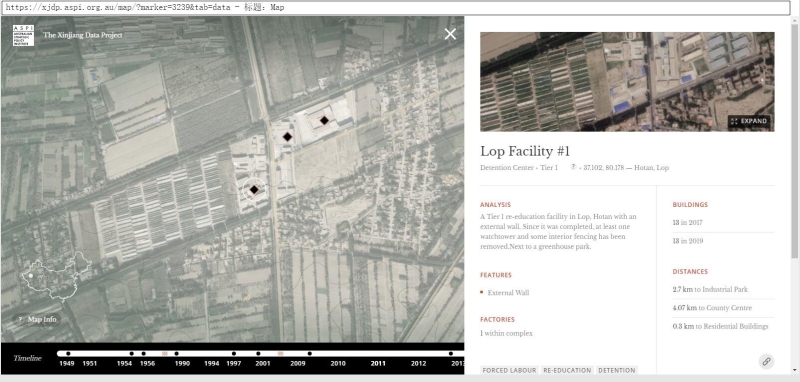
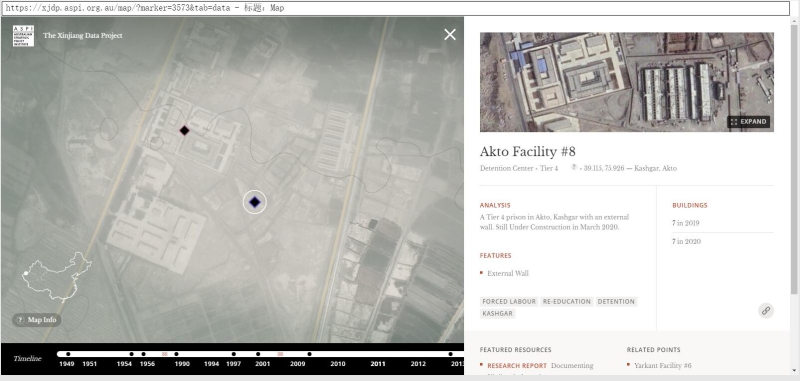
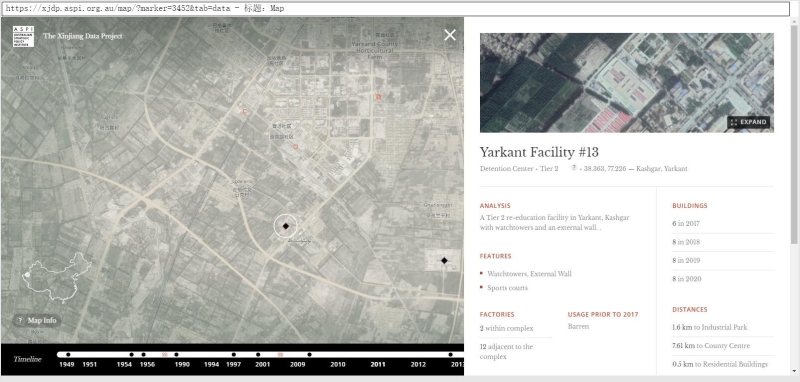
Now let’s connect Ms. Munire Tusun, a staff member of Disabled People Guarantee Center of Shache County in Kashgar via online video.
Hello, Ms. Munire Tusun. We are holding a press conference on Xinjiang related issues in Beijing. Some people abroad falsely claimed that through satellite images, 380 “detention camps” had been built in Xinjiang, and the vocational education and training center is located in the place where you are. What do you think of it?

Photo taken on September 17, 2021 shows Munire Tusun speaks at the 55th Press Conference on Xinjiang-related Issues in Beijing via online video. Photo by Xinjiang Daily/ Zou Yi
Munire Tusun: I’m Munire Tusun, working in Disabled People Guarantee Center of Shache County. Our center was built in 2015 and has been used for rehabilitation and care for the disabled. Some people outside China use satellite images to say that our center has been used as an vocational education and training center. It is not true.
Xu Guixiang: Now let’s connect Mr. Aihaiti Aihemaiti, President of Socialist School of Lop County in Hotan Prefecture via online video.
Hello, Mr. Aihaiti Aihemaiti. We are holding a press conference on Xinjiang related issues in Beijing. Some people outside China falsely claim that the place where you are is a “vocational education and training center”. Please introduce the case.
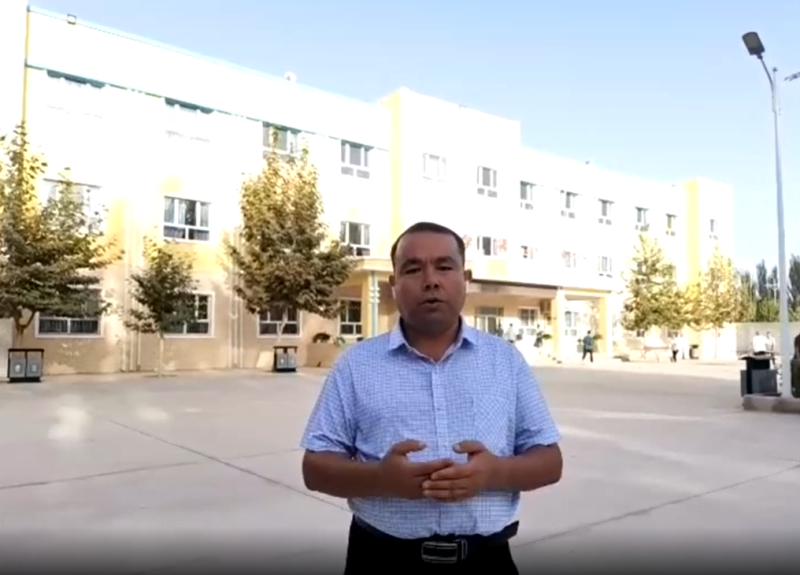
Photo taken on September 17, 2021 shows Aihaiti Aihemaiti speaks at the 55th Press Conference on Xinjiang-related Issues in Beijing via online video. Photo by Xinjiang Daily/ Zou Yi
Aihaiti Aihemaiti: I’m Aihaiti Aihemaiti, President of Socialist School of Lop County. Our school is a special place for non party personages to get training and learning. The school was put into use in May 2016 with an investment of 4.5 million yuan and a total area of 15 mu. At the school, there is a teaching building and a dormitory building equipped with complete hardware and software facilities. It is a standardized professional school which provides integrated functions including boarding and lodging, learning, cultural and sports activities and electronic reading room. It has never been used as a vocational education and training center.
Xu Guixiang: Now lets connect Mr. Tu’erhongjiang Abula, President of No. 2 People’s Hospital (Hospital of Uygur Medicine) of Shaya County, Aksu Prefecture via online video.
Hello, Mr. Tu’erhongjiang Abula. We are holding a press conference on Xinjiang related issues in Beijing. Some people outside China falsely claim that the place where you are is a “vocational education and training center”. Please introduce the case.
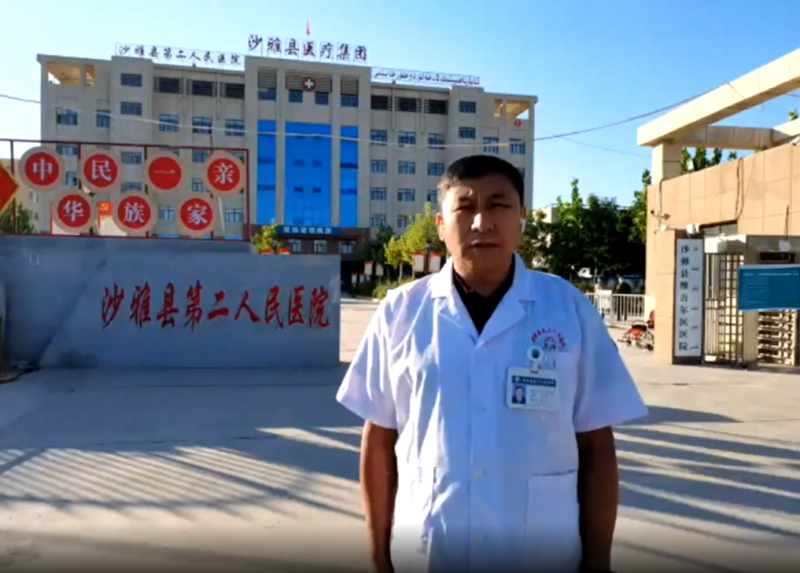
Photo taken on September 17, 2021 shows Tu’erhongjiang Abula speaks at the 55th Press Conference on Xinjiang-related Issues in Beijing via online video. Photo by Xinjiang Daily/ Zou Yi
Tu’erhongjiang Abula: I’m Tu’erhongjiang Abula, President of No. 2 People’s Hospital (Hospital of Uygur Medicine) of Shaya County, Aksu Prefecture. Some foreign media say that our hospital is a vocational education and training center of Shaya County. It is completely a false guess. Our hospital was established in 1988. I became the president of the hospital in 2013. Up to now, it has always been No. 2 People’s Hospital (Hospital of Uygur Medicine) of Shaya County and it has never been used for other purposes.
Xu Guixiang: Now let’s connect Mr. Abudumiti, head of The Grain Reserve Center of Grain Collection And Storage Company in Akto County, Kizilsu Kirgiz Autonomous Prefecture.
Hello, Mr. Abudumiti. We are holding a press conference on Xinjiang related issues in Beijing. Some people outside China falsely claim that the place where you are is a “vocational education and training center”. Please introduce the case.
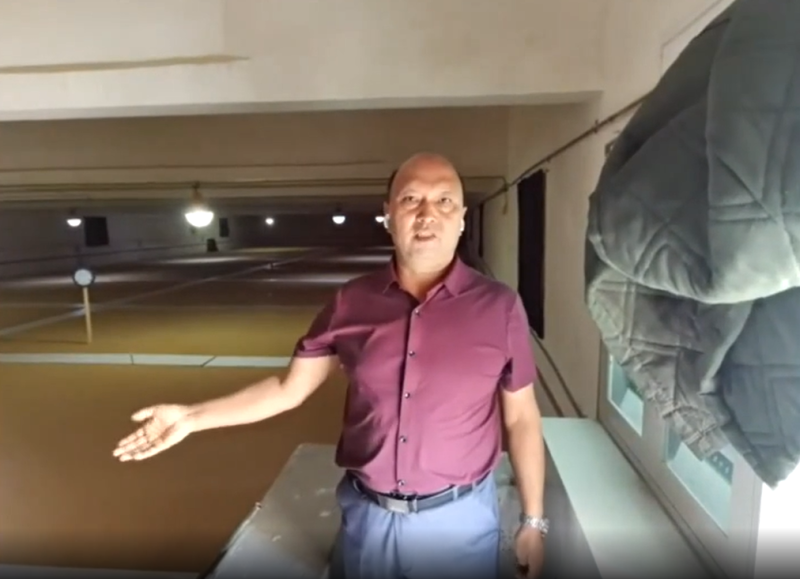
Photo taken on September 17, 2021 shows Abudumiti speaks at the 55th Press Conference on Xinjiang-related Issues in Beijing via online video. Photo by Xinjiang Daily/ Zou Yi
Abudumiti: I’m Abudumiti, head of The Grain Reserve Center of Grain Collection And Storage Company in Akto County. The reserve center was built in 2009. This place used to be a Gobi. Through afforestation, construction of office buildings, warehouses and so on, the place has developed into a grain reserve center like this. These are our grain warehouses. There are eight such warehouses, all full of grain. It has never been used for other purposes.
Xu Guixiang: What is the real situation about labor security? Now let’s connect cotton farmers in Changji, Xinjiang, migrant workers from Kizilsu Kirgiz Autonomous Prefecture, tomato growers in Bayingol Mongolian Autonomous Prefecture and relevant enterprises via online video to listen to what they say.
First, let’s connect Wang Jintai, farm technician of Changji National Agricultural Science And Technology Park via online video.
Hello, Mr. Wang Jintai. We are holding a press conference on Xinjiang related issues in Beijing. You are welcome to attend it. In April this year, we invited foreign media reporters to visit your cotton field in Changji. How is your cotton? Please brief it.
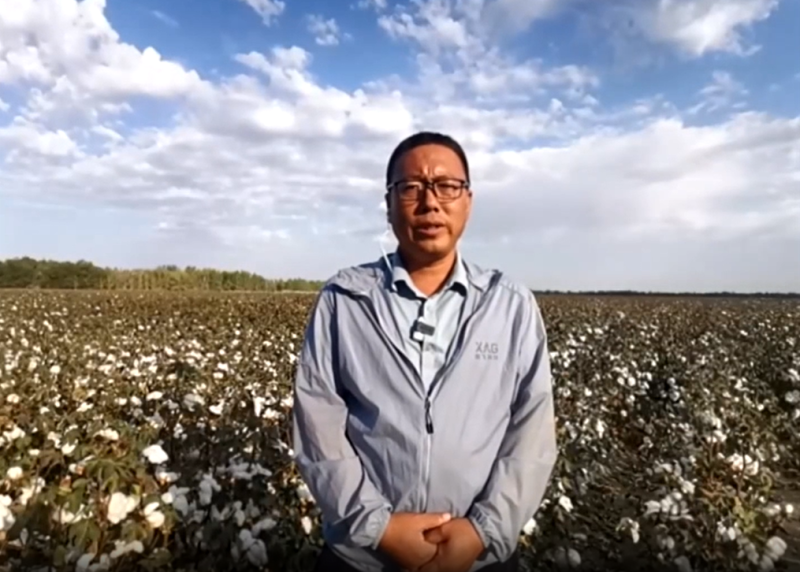
Photo taken on September 17, 2021 shows Wang Jintai speaks at the 55th Press Conference on Xinjiang-related Issues in Beijing via online video. Photo by Xinjiang Daily/ Zou Yi
Wang Jintai: I’m wang Jintai, a farm technician in Changji National Agricultural Science And Technology Park. Our farm started agricultural production in 1997, with a total area of 11290 mu. It mainly grows cotton, watermelon and grapes. At present, there are 80 employees (technicians), 10 planters, 6 UAVs and 6 cotton pickers(machine).
The cotton field behind me totals 600 mu, managed by four people who are responsible for all work from sowing in spring to harvest in autumn. In spring, it takes about 4-5 days to complete all sowing work with a large cotton planter equipped with Beidou navigation. In autumn, all cotton pickers are used to harvest, and it only takes 13-16 hours to finish all cotton picking work.
Our farm has a high mechanization rate. At the beginning of 2000, we began to use the planter, at the end of 2010, the picking machine, and in 2015, the UAV. picking machines, UAVs and other machines are equipped with navigation equipment. A mobile phone with a remote client can complete sowing, picking, fertilization and pesticide spraying. Take UAV as an example, UAV is mainly used for daily field management, cotton operation, topping and pest control and prevention. Now the technology is very mature. We don’t need much labor at all. There is no “forced labor” at all.
Xu Guixiang: Now let’s connect Mr. Yusupujiang Yasenjiang from Akto County, Kizilsu Kirgiz Autonomous Prefecture via online video. He once worked in an inland province. We will invite him to tell us his story.
Hello, Mr. Yusupujiang Yasenjiang. We are holding a press conference on Xinjiang related issues in Beijing. Please share your story with us.
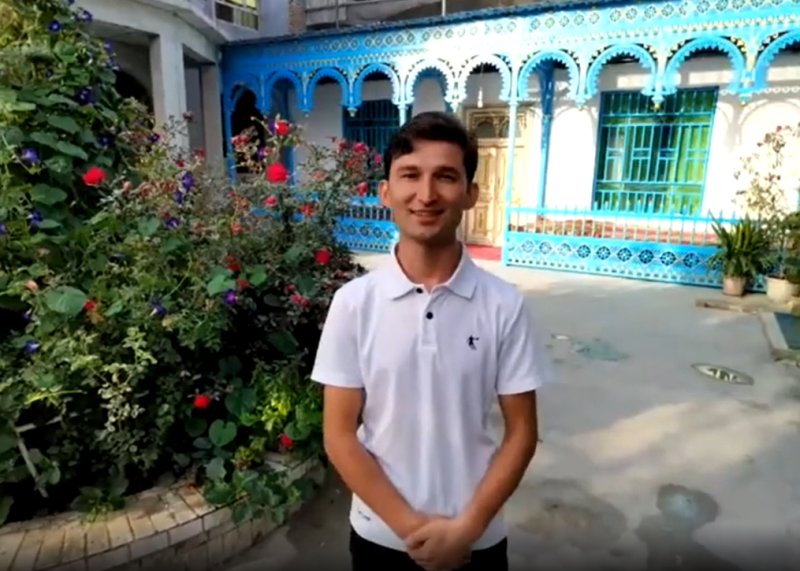
Photo taken on September 17, 2021 shows Yusupujiang Yasenjiang speaks at the 55th Press Conference on Xinjiang-related Issues in Beijing via online video. Photo by Xinjiang Daily/ Zou Yi
Yusupujiang Yasenjiang: I’m Yusupujiang Yasenjiang from Kizilewustan Village, Baren Township, Akto County, Xinjiang. Now I’m engaged in interior decoration. Here is the house we are decorating, which is designed and decorated by myself. Look, the color of the house is carefully designed by us, especially featuring modern style with clean and bright look. This curtain is also carefully selected. It not only has ethnic style, but also integrates popular elements, matching the overall layout very well. These designs are derived from my 3 years of working experience. I came into contact with all kinds of new things during my working outside.
In October 2017, through a friend’s introduction, I went to work with several fellows in a company in Nanchang, Jiangxi Province, which mainly engages in the assembly of mobile phone accessories. The company signed a labor contract with us, and our rights and interests were protected by law. The company provided us with staff dormitories free of charge. The dormitory has very good conditions including refrigerators, air conditioners, washing machines, water heaters and so on. One year later, due to my good skills, I became a team leader, and my salary rose from 4500 yuan to 5500 yuan. We work 8 hours a day and have two days off work on Saturday and Sunday. We can ask for leave. On days off work, I like to travel to various scenic spots. The company respects our customs very much. It has a halal canteen and hired two chefs from Urumqi to cook for us. After work or during the rest on Saturday and Sunday, religious workers can go to the mosque to worship.
In August 2019, because my parents were in poor health and needed to be taken care of, I reluctantly left the company and returned to my hometown. With more than 90,000 yuan I earned, I started the house decoration business with my father, with an annual income of more than 300,000 yuan. At the end of last year, our family built a two-story building, bought new furniture and new household appliances. Our life is better and better. Is it wrong for me to take the initiative to go out to work? Do we need to be forced by others to make money and live a happy life? The real purpose of those people who spread rumors is to deprive us of our jobs, leave us in poverty and prevent us from living a good life. How shameful and hateful they are. Their conspiracy will never succeed.
Xu Guixiang: Now let’s connect Mr. Reheman Tu’erson, a villager in Naimenmodun Town, Hejing County, Bayingol Mongolian Autonomous Prefecture via online video, and listen to his story of tomato planting.
Hello, Mr. Reheman Tu’erson. We are holding a press conference on Xinjiang related issues in Beijing. We have learned that it is the season of tomato harvest. Please give us a brief introduction about it.
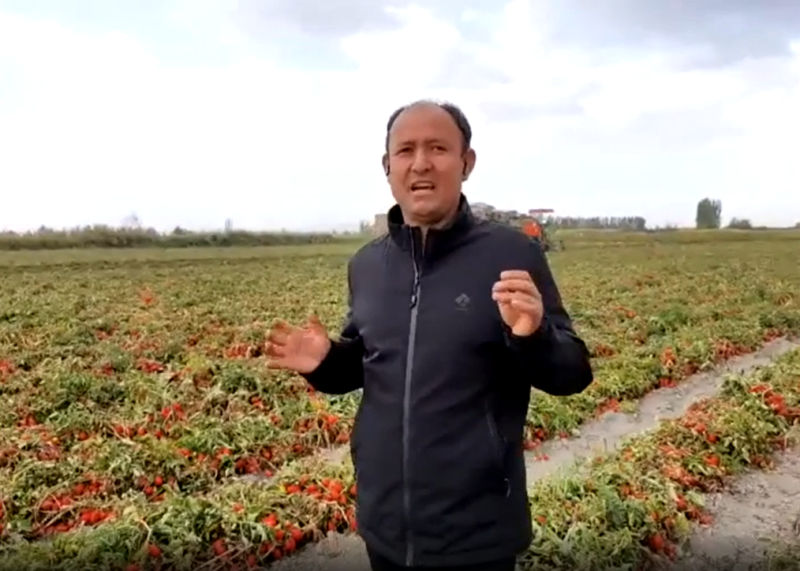
Photo taken on September 17, 2021 shows Reheman Tu’erson speaks at the 55th Press Conference on Xinjiang-related Issues in Beijing via online video. Photo by Xinjiang Daily/ Zou Yi
Reheman Tu’erson: I’m Reheman Tu’erson, a villager in Group 2, Naimenmodun Village, Naimenmodun Town. There are four people in my family. My wife is a housewife and we have two sons. The eldest son is in grade 7 and the youngest son is in grade 4 this year.
I’m busy collecting tomatoes now. Yesterday I ordered harvester service and the harvester came early this morning. The mechanical harvesting is very good. It is good in efficiency and quality. It also saves a lot of harvesting costs and saves me a lot of worry. Unlike before, I had to worry that tomatoes would not be harvested in time and went rotten in the field. Look, the machine goes past like this and the tomatoes are collected and loaded directly into the tractor. How good!
The harvester directly collects and loads tomatoes into the tractor, which is very convenient. After tomato loading is done, the tomatoes are directly carried by the tractor to a tomato ketchup factory in the south of our township. We have signed a contract with the factory, before and then sell the tomatoes to them. Their factory makes ketchup. We usually buy bottled ketchup and eat hamburgers with it. The ketchup we eat are all produced by these factories. Our tomatoes are very delicious. They are all purely natural and grow in the sun. Look at this tomato, a lot of juice in it. It’s red and tastes a little sour and sweet. Xinjiang noodles cooked with it is very delicious. I would like to give you one and you can taste it. These ketchup are sold to inland cities and some are also exported abroad. Our tomatoes are very good and in short supply.
Our family planted 40 mu of tomatoes this year. We can collect 480 tons of tomatoes in total with per mu yield of 12 tons. Now our gross income of tomatoes is about 250,000 yuan with the price of 0.5 yuan per kilogram. The price this year is better than that in last year, and the price in last year is 0.3 yuan per kilogram. This year the tomato output has also increased, and the price is good. Planting tomato is a good business. Next year, we plan to contract another 100 mu of farmland to increase our income. Now mechanized planting saves a lot of labor. I will plant more tomatoes.
I am very happy about the good life. We farmers have a bumper harvest and earned money. There's a song entitled “we people are really happy today”. I’ll sing a few lines... This is my feeling. Now my family has also bought a car. We have an earthquake resistant house in the village. I also have a house in the county proper. In summer, I do some farming work and live in the village. In winter, I live in the county proper. I walk around the county proper, stroll around the bazaar, have dinner with my friends and travel out together. I like this life very much and I am very satisfied.
Xu Guixiang: Now, let’s connect Mairiguli Nu’er’aihemaiti via online video. She is a migrant worker from Xinjiang, now working in Anhui Province.
Hello, Mairiguli Nu’er’aihemaiti. We are holding a press conference on Xinjiang related issues in Beijing. Please tell us about your situation.
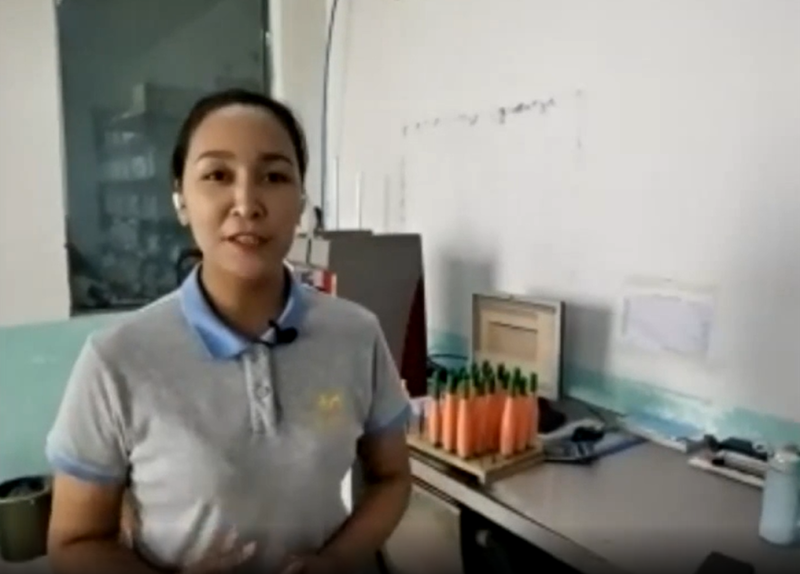
Photo taken on September 17, 2021 shows Mairiguli Nu’er’aihemaiti speaks at the 55th Press Conference on Xinjiang-related Issues in Beijing via online video. Photo by Xinjiang Daily/ Zou Yi
Mairiguli Nu’er’aihemaiti: I’m Mairiguli Nu’er’aihemaiti, 24 years old, from Tugemanboyi Village, Kuoshitage Town, Pishan county. There are five people in my family. The income of my family mainly come from farming, and the conditions in my family was very common. I want to change my present life and live a well off life by going out to work. In 2017, I signed up for work in Youngor Color Textile Technology Company in Chaohu City Anhui Province and signed a labor contract. I am now a technician in the quality planning department of the company and responsible for quality inspection. In the company, I met my present husband, who is an operator in a workshop. We had a wedding in 2019. The company specially arranged a husband and wife dormitory for us. The dormitory has good conditions and is very spacious. There are all kinds of furniture. We feel the atmosphere of home at dormitory. On Rouzi Festival this year, the company held an- evening party and gave everyone red envelope with lucky money, which gave us an unforgettable Festival. This is our second home. Now my husband and I together have a monthly salary of more than 8000 yuan. We are very satisfied with our present life.
Xu Guixiang: Now let’s connect Hong Longzhu, the person in charge of Eagle Textile Co., Ltd. of Shache County Xinjiang via online video. Affected by the U.S. and Western sanctions, the company has suffered some losses. We also understand that they are safeguarding the legitimate rights and interests of the company through legal channels.
Hello, Mr. Hong Longzhu. We are holding a press conference on Xinjiang related issues in Beijing. We are also very concerned about the situation of your company. Next, please brief your situation to us.

Photo taken on September 17, 2021 shows Hong Longzhu speaks at the 55th Press Conference on Xinjiang-related Issues in Beijing via online video. Photo by Xinjiang Daily/ Zou Yi
Hong Longzhu: I’m Hong Longzhu, the person in charge of Eagle Textile Co., Ltd. of Shache County Xinjiang. In June 2017, with my savings of 10 million yuan, I brought my family from Qingdao, Shandong to Shache County, Kashgar, Xinjiang to invest in a factory. After initial struggle and hard work, in February 2018, our Eagle Textile Co., Ltd. was finally officially put into operation. The company covers an area of 30 mu, with more than 900 employees, 24 production lines and more than 500 sets of advanced sewing equipment. It mainly produces knitted clothes, sports uniforms, pajama suits, etc. The company passed BSCI certification in April 2019 and became a foreign-related manufacturer with export qualification. It has an annual output volume of 4 million and an export value of 8 million US dollars. The employees in the company are mainly local Uygur people. Before they came to the company, they all relied on farming and odd jobs to support their families. After they got employed in the company, they had a stable income. With the stable income, many families bought cattle and sheep and built new houses, and their lives have changed greatly.
In June 2019, the company’s foreign orders decreased slowly. Later, I learned that this was because Adrian Zenz, an overseas anti-China element, slandered the cotton industry in Xinjiang and said that there was “forced labor”. The United States and the west imposed sanctions on cotton products in Xinjiang based on these lies. Some overseas enterprises have terminated cooperation with us for fear of being implicated in sanctions. European and American partners have proposed that as long as enterprises withdraw from Xinjiang and do not hire Xinjiang Uygur workers, they will not be affected. I am very dissatisfied with this. Can Uygurs only be farmers and herdsmen and have no right to work in factories? Isn’t the United States shouting human rights every day? Is the so-called “human rights” in the United States to deprive other people of their jobs and see them go hungry?
In April this year, the company filed a lawsuit in the Kashgar Intermediate People’s Court, requesting the court to order Adrian Zenz to stop the infringement, eliminate the impact, restore the reputation of cotton industry, make an apology and compensate for the losses of the enterprise. Up to now, the subpoena required by the court for Adrian Zenz to respond to the lawsuit has been sent out. I hope I can ask him face to face. Do you know much about our company and the labor situation in Xinjiang? How dare you slander us!
In order to reduce the negative impact of sanctions, our company adjusted its development direction from export to domestic sales and actively developed domestic customers. At present, the company’s production capacity is recovering, and the profit has been able to maintain the normal operation of the company. I believe that with the efforts of all employees, the development of our company will be better and better.
Xu Guixiang: Now let’s turn to another issue--family planning. What’s the actual situation? Next, let’s connect Ms. Nu’erbiye Abulimiti via online video, a village doctor of Bashixiaheleke Village, Buya Township, Lop County, Hotan Prefecture, and listen to what she said.
Hello, Ms. Nu’erbiye Abulimiti. We are holding a press conference on Xinjiang related issues in Beijing. You are welcome to attend it. Please brief the situation of family planning in your village.
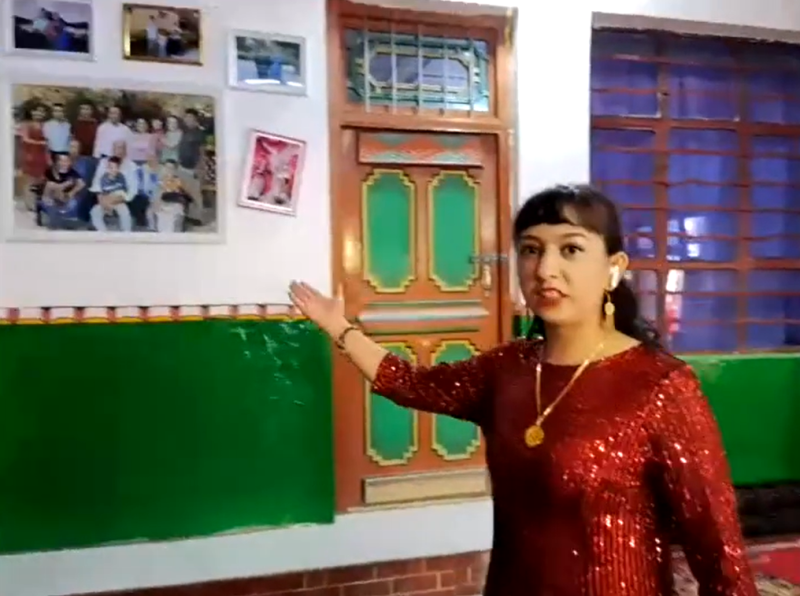
Photo taken on September 17, 2021 shows Nu’erbiye Abulimiti speaks at the 55th Press Conference on Xinjiang-related Issues in Beijing via online video. Photo by Xinjiang Daily/ Zou Yi
Nu’erbiye Abulimiti: I’m Nu’erbiye Abulimiti. I’m a village doctor in Bashixiaheleke Village, Buya Township, Lop County, Hotan Prefecture. My family has four generations. Please follow me to see my big family. This is our family photo, a total of 36 people. My grandmother told me that in the past, she had many children, so she had heavy family burden and she could only stay at home to take care of her children every day. She often said that today’s young people should follow the suit of her generation who could only commit themselves to children and couldn’t do anything they like to do.
Now, we women’s fertility mindset has changed greatly. Everyone thinks that eugenics is particularly good. More and more people choose late marriage and late childbirth, and fewer and better birth as well. We are no longer like my grandmother’s generation. We have time to do our own favorite things. Take me for example, after I got married, my husband and I chose to have one child. We both have stable jobs. The conditions in my family are getting better and better. My family of 3 people have a very happy life. In two years, when the child grows up, we are ready to have another one. As a woman in the new era, I think it’s OK to have two or three children. In this way, I can take good care of my children and cultivate them, have time to do my own things well at the same time, and fulfil my life value.
Xu Guixiang: Now let’s learn cultural protection in Xinjiang. What are the facts? Next, we will connect Hami, Kashgar, Hotan, Kezhou and other places via online video to invite local people to introduce the inheritance and protection of ethnic minority culture.
First of all, let’s connect Guzhalinu’er Skandan, the embroiderer of Hami Intangible Cultural Heritage Center via online video. Hami embroidery is very famous. It is the first time for us to learn about this through online video. Hello, Ms. Guzhalinu’er Skandan. We are holding a press conference on Xinjiang related issues. We want to know about Hami embroidery.
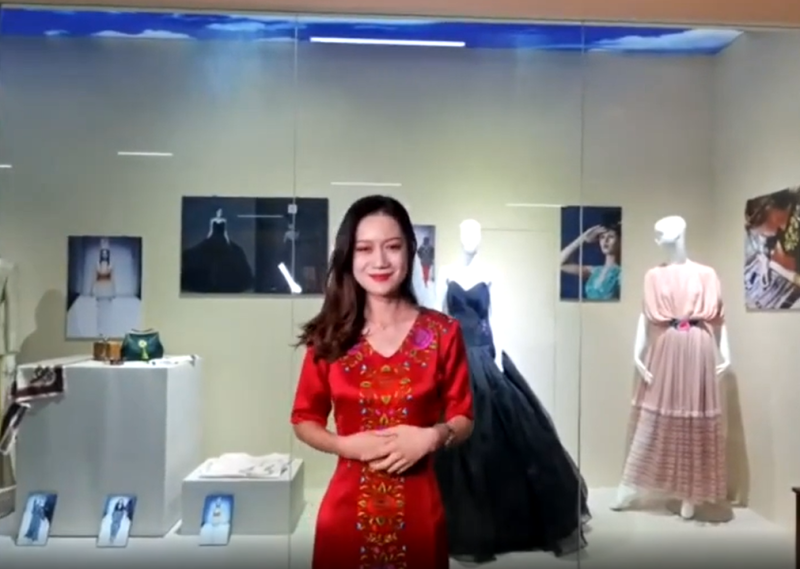
Photo taken on September 17, 2021 shows Guzhalinu’er Skandan speaks at the 55th Press Conference on Xinjiang-related Issues in Beijing via online video. Photo by Xinjiang Daily/ Zou Yi
Guzhalinu’er Skandan: Hello, I’m Guzhalinu’er Skandan, the embroiderer of Hami Intangible Cultural Heritage Center. Look at my watch. Isn’t it beautiful? It uses the traditional Uygur embroidery pattern in Hami. Today, I’ll take you to learn about Hami Uygur embroidery.
Hami Uygur embroidery has a history of two or three hundred years. As early as the Kangxi rule of the Qing Dynasty, after the king of Hami went to Beijing to meet the emperor, more than a dozen embroidery women were invited to Hami to teach embroidery skills to local Uygur women. It was then that my ancestors learned the art of embroidery. Look at this little flowery hat. It has been handed down for six generations in my grandmother’s family. The pattern on it was embroidered by my great great grandmother. She used to be the embroiderer of King Hami’s court. Look, this is a picture of my grandmother Ajiahan. She is the trustee of national intangible cultural heritage. There are more than 300 kinds of embroidery patterns saved by my grandmother. Let’s have a look. They are very beautiful.
In 2008, Hami Uygur embroidery was listed in the second batch of national intangible cultural heritage protection projects. In 2016, the Ministry of culture and tourism set up the first traditional craft workstation in Hami, forming a cooperation mode of “government + enterprise + university + embroiderer”. Batches of embroiderers went to colleges and universities in Guangzhou, Suzhou and Beijing to participate in skills and design training, which has enabled more than 4,000 embroiderers to have increased their income and have a well off life. These are the fashionable dresses we designed or whose designing we have participated in. The elements of Hami Uygur embroidery were integrated into the design, and the fashion was also showed on the stage of Paris fashion week, France. We all hope to pass on this embroidery skill and carry it forward, so that our Hami Uygur embroidery can go to the world and find its way on a bigger stage.
Xu Guixiang: Thank you. Your introduction has given us a lot of knowledge and a better understanding of Hami embroidery. In particular, the works you showed to us really impressed us greatly with the fine craftsmanship, dazzling color and exquisite skill. We appreciate it very much. I wish you to do better in inheriting and protecting the culture of ethnic minorities and take more contributions to it. Thank you.
Next, we’ll have online video connection with the director of the Twelve Muqam Inheritance Center in Shache County--Yilihamu Reyimu, to give us some detailed information. Mr. Yilihamu Reyimu, welcome to join us in today’s press conference. As a trustee of the Twelve Muqam, what are your stories about it?
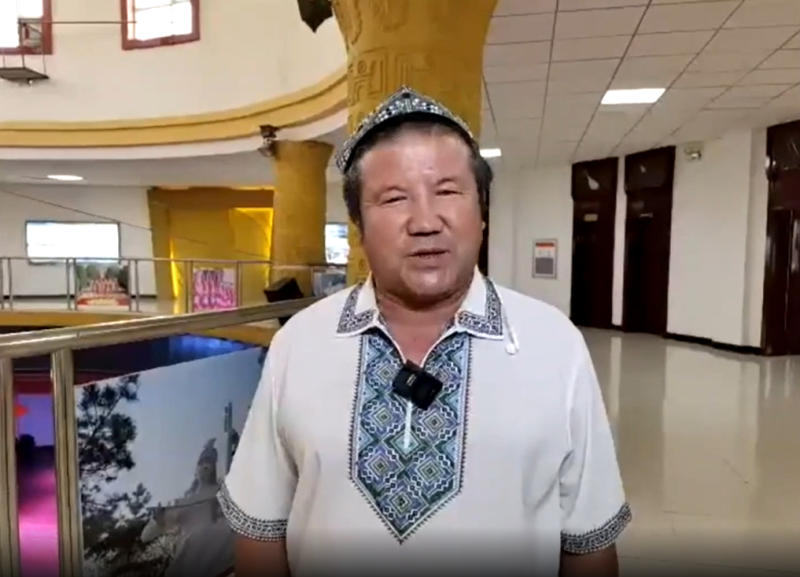
Photo taken on September 17, 2021 shows Yilihamu Reyimu speaks at the 55th Press Conference on Xinjiang-related Issues in Beijing via online video. Photo by Xinjiang Daily/ Zou Yi
Yilihamu Reyimu: Good morning, everyone. My name is Yilihamu Reyimu, the director of the Twelve Muqam Inheritance Center of Shache County and one of the trustees of the Twelve Muqam.
Today, I’d like to play a piece of the Twelve Muqam with Sattar. This musical instrument has 13 strings and is an inseparable instrument in the performance of the Twelve Muqam. My Sattar has been with me for over 40 years.(playing live)
I’m a native of Shache County, Xinjiang. My father and my grandfather were all well-known performers of the Twelve Muqam. Influenced by them, I developed deep interests for the art from childhood. I started to learn about it and performed with my father and grandfather since I was 6. When I turned 16, I was able to perform the Twelve Muqam by myself. After three generations’ commitment and hard-working, I now have become a fine trustee of the Twelve Muqam.
Our county attaches great importance to the protection of the Twelve Muqam. During the early days of the founding of the PRC, the country organized an experts group to rescue the Uygur Twelve Muqam and published the song-book of the Twelve Muqam(2 volumes)(showing pictures). In 1989, Xinjiang Muqam Art Troupe was founded, continuing the protecting, documenting and performing Uygur folk dances and music represented by Muqam. A large number of works were performed during this period. The Muqam research center was established in the same year, which completed the sorting and documenting of the Twelve Muqam and published the first edition of recording tape ( 2 discs per set, 24 discs in total ) (showing pictures).
As early as September 2005, the Uygur Muqam of Xinjiang was inscribed on the UNESCO Representative List of the Intangible Cultural Heritage of Humanity. After that, Xinjiang Uygur Autonomous Region established Muqam inheritance centers of national and regional levels in Shache County, Maigaiti County, Bachu Country of Kashgar Prefecture and Awati County of Aksu Prefecture, Shanshan County of Turpan and Hami City to ensure that Muqam trustees are in every place of Xinjiang. To better protect the art and pass it on to future generations, the government of Xinjiang held the Twelve Muqam Art Festival many times to let more people know about and experience the unique charm of the Twelve Muqam.
For many years, my colleagues from the Twelve Muqam folk art troupe and I have performed on many occasions. To name just a few--the recording of open class on intangible culture of Beijing Television, and the performance of intangible publicity week in Guangzhou, the exchanges in Dunhuang Night in Dunhuang, Gansu, as well as the Muqam performance at the Second China International Import Expo in Shanghai. We won the praise from a huge number of experts and media after each performance.(introduction and photos’ presentation of each performance).
As a trustee of the Twelve Muqam, I have witnessed the documenting, sorting, protection and passing down of it. During the process, the art has not been damaged one bit. Some foreigners accused Xinjiang of “eradicating the cultures of ethnic groups”, which is baseless and malicious.
Xu Guixiang: Thanks for the introduction as well as your beautiful Muqam performance. We are all intoxicated of it. Thank you very much and we wish you could do a even better job and contribute more to the protection of the Twelve Muqam.
Many people have visited the night market of Hotan. Recently, a chain catering was opened in Hotan, named the Hotan Cafeteria. Today, we’ll connect with the cafeteria online to see what it has to offer. Now, we’ll be online with a citizen of Hotan City-- Remila Maimaitijiang and let her introduce the delicacies of Hotan to us. Good morning, Remila Maimaitijiang. Thanks for joining us in today’s conference on Xinjiang-related issues. We heard that a chained catering was opened it Hotan and we’d like to know about it.
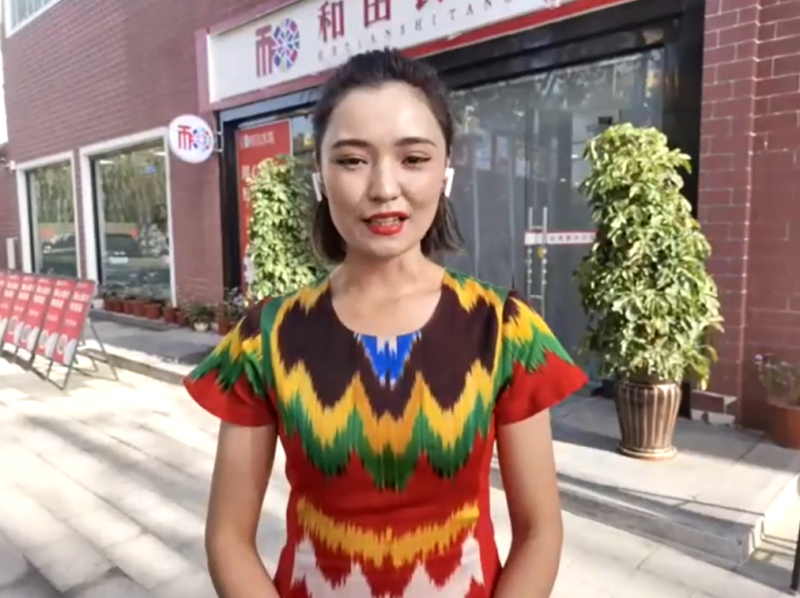
Photo taken on September 17, 2021 shows Remila Maimaitijiang speaks at the 55th Press Conference on Xinjiang-related Issues in Beijing via online video. Photo by Xinjiang Daily/ Zou Yi
Remila Maimaitijiang: My name is Remila Maimaitijiang. Right now, I’m at the newly opened chain restaurants in Hotan, the Hotan Cafeteria. I’m honored to introduce it to you.
In Hotan Cafeteria, local delicacies like Hotan Pulled Noodles and Hotan Barbecue can be seen on the menu of every restaurant. Let’s go and check out. I can smell of the scallions! This lady is making jianbing, a necessity for our breakfast. They are made of flour, eggs and scallions. Look at the golden sides of the jianbing, I’ll have two servings later.
The Mid-Autumn Festival is around the corner, and we can see there are many mooncakes here. These mooncakes are made in the Hotan way according to the dietary habits of local Uygurs. Let me try this. Its taste is really exquisite, soft and delicious and is made of walnuts, jujubes, rose sauce and so on, very nutritious. Both children and adults are fond of it.
The Hotan Zongzi also our specialty and cannot be found anywhere. This is my favorite yogurt Zongzi. It not only retains the taste of traditional Zongzi, but is loaded with stewed sugar sauces and mixed with local yogurt. It tastes sour and sweet, really amazing!
Jianbing, moocakes and Zongzi are all Chinese traditional food. In my hometown, Hotan, we can taste them all year round, which embodies the commonality of the great Chinese family. Welcome all of you to visit Hotan and have a taste of all the delicacies!
Xu Guixiang: Thanks for your introduction. We can see that the Hotan Cafeteria has lots of guests in it now. Because of the time difference, they probably are having breakfast. I used to think that Jianbing, mooncakes and Zongzi can only be found in places of inland China. It is to my surprise that they have been in Hotan for so many years and have already become an essential part of local people’s diet. Indeed, like you said, we can sense the commonality of the Chinese culture. Thanks for your introduction. You are now available to order your Jianbing and enjoy your breakfast. Thanks again!
Next, we’ll have online video connection with Mr. Muta’erbieke Duixieyimu-- the trustee of intangible cultural heritage of Manas in Aheqi County in Kizilsu Kirgiz Autonomous Prefecture. Good morning, Mr. Muta’erbieke Duixieyimu. Welcome to join the conference on Xinjiang-related issues. What’s your comment on the accusation by some external forces of Xinjiang “eradicating the cultures of ethic minorities’” and exercising “culture extinction”?
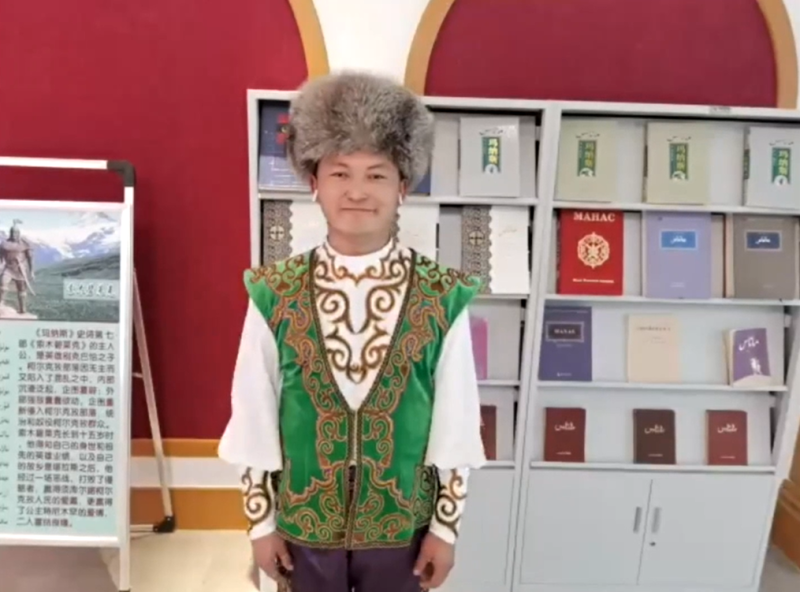
Photo taken on September 17, 2021 shows Muta’erbieke Duixieyimu speaks at the 55th Press Conference on Xinjiang-related Issues in Beijing via online video. Photo by Xinjiang Daily/ Zou Yi
Muta’erbieke Duixieyimu: My name is Muta’erbieke Duixieyimu and I’m of Kirgiz ethnicity, 29 years old. Where I am at now is the research center of Manas in Aheqi County, Kizilsu Kirgiz Autonomous Prefecture. I’m an enthusiast of Manas as well as an trustee of it.
Manas in one of the three heroic epics in China. Kirgiz history, literature, folk, music are the its main content. The state attaches great importance to the protection and inheritance of Manas by organizing relevant experts to collect and document it. In 2006, Manas was listed as the first batch of national intangible cultural heritage list. In 2009, it was included in as the UNESCO Human Intangible Cultural Heritage List, making the world has a deeper understanding of Kirgiz culture. At present, more than twenty million lines in eighteen volumes have been documented and compiled, and translated into national spoken and written language, Uygur, Kazak, English, Russian, Japanese and other languages. In order to protect the culture of Manas, the government also gives strong support to its trustees. Manas is a part of the splendid Chinese culture of which I am proud. I will sing a part of it for you now.
Xu Guixiang: We have got a more direct understanding of Manas after your wonderful performance. Thanks very much.
The next topic is about the religious affairs in Xinjiang. What are the realities? Let’s have online connection with relevant personnel in Urumqi, Aksu and Hotan to get some information on the freedom of religious belief there.
First, let’s connect with the Imam of Xuanrendun Mosque of high-tech zone in Urumqi-- Sikaidan Reyimu. Sikaidan Reyimu, welcome to join us in today’s conference on Xinjiang related issues. Please introduce us with relevant information about Xuanrendun Mosque.
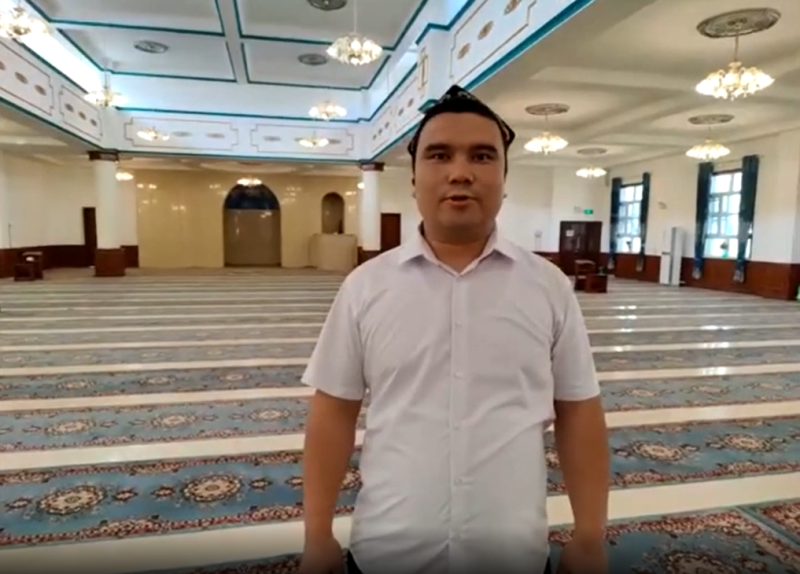
Photo taken on September 17, 2021 shows Sikaidan Reyimu speaks at the 55th Press Conference on Xinjiang-related Issues in Beijing via online video. Photo by Xinjiang Daily/ Zou Yi
Sikaidan Reyimu: My name is Sikaidan Reyimu, the Imam of Xuanrendun Mosque in high-tech zone, Urumqi.
Xuanrendun Mosque is located at Diwopu township, high-tech zone(new urban area), Urumqi. In 2016, according to the urban construction plan, all the villagers of the second team of Xuanrendun village relocated to the site, and a new residential compound was built for all them. To meet the villagers’ need for religious activity after relocation, the mosque was built and put into service in September, 2020.
The mosque covers an area of 3000 square meters and a building area of 2349 square meters, of which 680 square meters are the hall with 1669 square meters ancillary facilities. The mosque is equipped with all the facilities needed, including dining hall, kitchen, cleansing rooms, bathrooms, offices. Public service facilities such as water, electricity, gas, cultural bookstores, fire extinguishers are in use. The religious believers are quite pleased by the bright, clean and safe mosque. Religious believers of Uygur, Hui and Kazak and other ethnicity come to our mosque for religious activities. Currently, religious affairs of all kinds are carried out normally.
Xu Guixiang: Thanks for your introduction and for letting us have a look at the tidy and spacious mosque. Next, we’ll have online discussion with the vice-president and secretary-general of the Islamic Association of Hotan City, Hotan Prefecture-- Maitinuri Maimaitirouzi. Hello, Maitinuri Maimaitirouzi. We are now holding the press conference on Xinjiang-related issues. Thanks for joining us. We’d like to know about mosques in your district. Please give us a brief introduction.
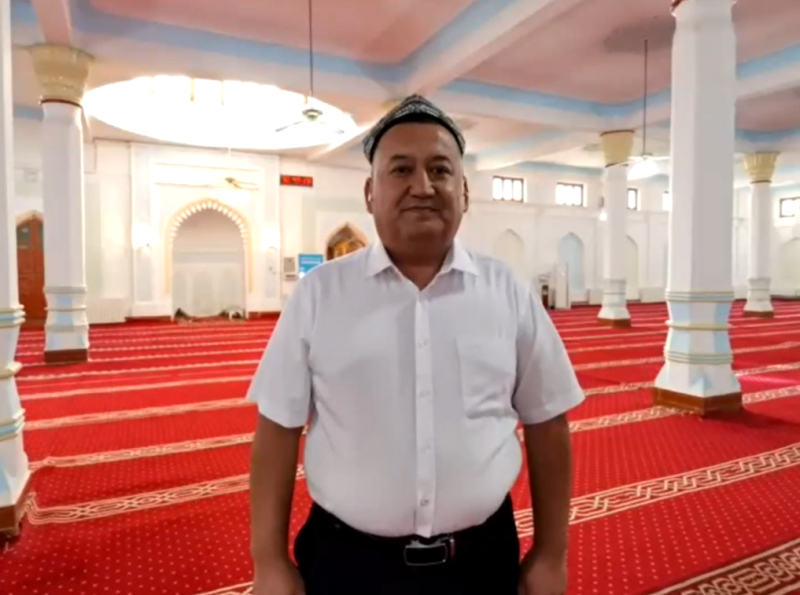
Photo taken on September 17, 2021 shows Maitinuri Maimaitirouzi speaks at the 55th Press Conference on Xinjiang-related Issues in Beijing via online video. Photo by Xinjiang Daily/ Zou Yi
Maitinuri Maimaitirouzi: I’m the vice-president and secretary-general of the Islamic Association of Hotan City, Hotan Prefecture-- Maitinuri Maimaitirouzi.
I’m at Jiamai Mosque in Hotan City now. It was built in 1848 with a history of 170-plus years, covering 4,816 square meters land area and 2,376 square meters building area. The mosque has been renovated many times during its history, the latest one in 2019.
The mosque is equipped with running water, electricity, and easy road access as well as radio and television facilities, natural gas, and fire-fighting appliances after efforts in recent years. As you can see now, the environment is beautiful with large coverage of greenery. Other facilities include a library, cleansing rooms with flushing toilet and lockers and shoe sets in front of the service hall. These facilities have brought great conveniences for religious believers and earned our satisfaction.
Some external forces say that the mosques in Xinjiang are all “demolished”. They are wrong. I hope you will not be blinded by their malicious lies.
Xu Guixiang: The last topic is on the boarding schools in Xinjiang. Let’s connect with the head of Bageqi Township Middle School--Wumai’erjiang Ku’erban, to see what he has to say.
Welcome, Wumai’erjiang Ku’erban. We are having press conference on Xinjiang-related issues. We’d like to know some information on the boarding schools
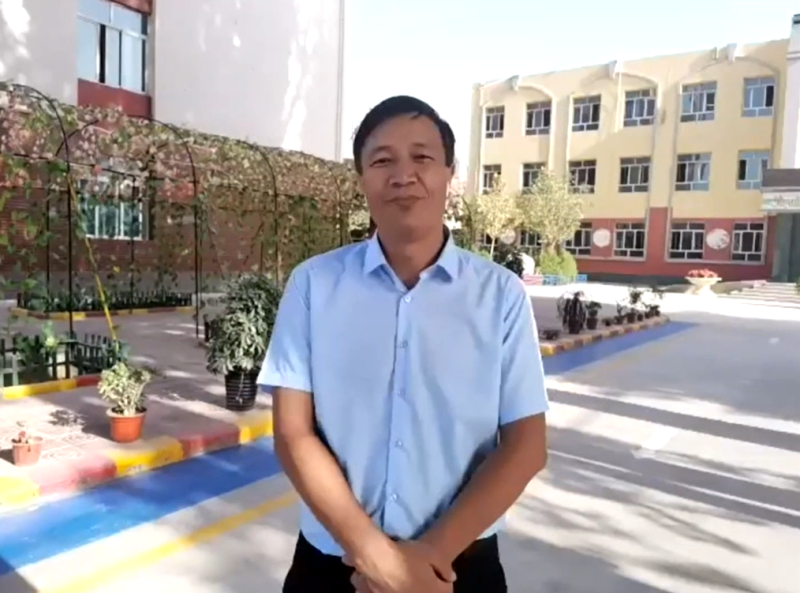
Photo taken on September 17, 2021 shows Wumai’erjiang Ku’erban speaks at the 55th Press Conference on Xinjiang-related Issues in Beijing via online video. Photo by Xinjiang Daily/ Zou Yi
Wumai’erjiang Ku’erban: Hello, everyone. I’m the vice-head of vice-headmaster of Jinghe High School, a boarding school, in Hotan County, Hotan Prefecture. The reason to practice the system of boarding school is because Xinjiang is so vast in land area. Some students’ homes are distant from school, and boarding schools can save the time for both parents’ and children.
The school has a strict construction standard to ensure that students have a safe, spacious and comfortable environment for learning and living. The school funding is entirely shouldered by the government. In the compulsory education stage, free education is provided for students in boarding schools as are students in other schools. Rural boarding students are also provided with free food and accommodation, and enjoy special living allowances. Each student in primary school is given 1,250 yuan per school year, and each student in junior middle school 1,500 yuan per school year, which effectively reduces the economic burden of students’ families. The school has teachers taking care of the students’ daily lives. Students go home for weekends on Friday afternoon and return to school on Sunday afternoon, and can spend their summer and winter vacation at home. Whether students attend boarding school or not, it is entirely up to the students and their parents. The so-called “forced boarding” doesn’t exist at all.
Xu Guixiang: Thanks for your introduction. From you introduction, we can see the school is well-equipped and the campus is tidy and beautiful. We wish the success, and the smooth operation of the school and a healthy growth of all the students.
Journalists, we have connected 24 grassroots officials and representatives of ordinary people and have learned about relevant information on anti-terrorism, vocational education and training centers, employment, protection of cultures, freedom of religious belief and school education. I believe all of you have gained a better understanding on these issues and is able to tell who is lying on Xinjiang-related issues.
Next, you can raise questions on your concerned questions. First, journalist from China News Service.
China News Service: Recently, some media accused China of setting up “black prison” in Dubai used for confining dissidents and Uygurs. What’s your comment on that?
Xu Guixiang: Let’s welcome the spokesperson for the people’s government of Xinjiang Uygur Autonomous Region-- Elijan Anayat to answer.
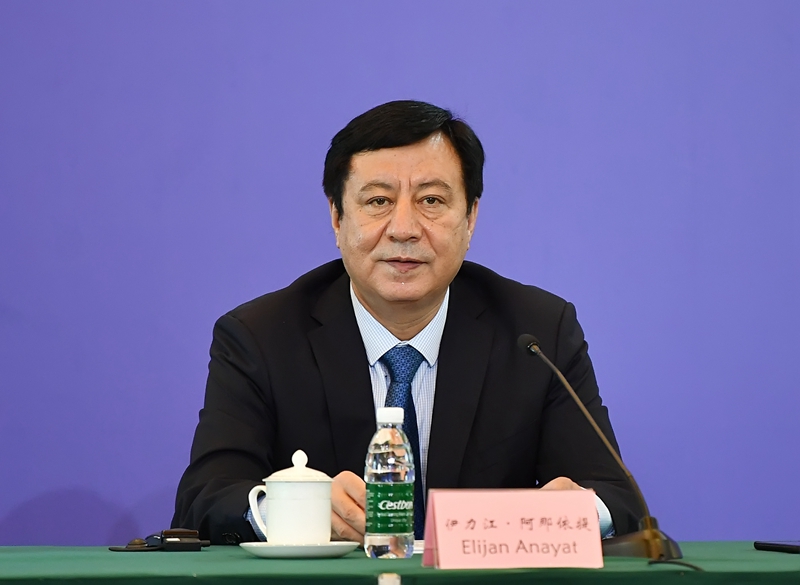
Photo taken on September 17, 2021 shows Elijan Anayat, spokesman of People’s Government of Xinjiang Uygur Autonomous Region answers questions at the 55th Press Conference on Xinjiang-related Issues in Beijing. Photo by Xinjiang Daily/ Zou Yi
Elijan Anayat: The Times and other media have been been making up and spreading fake news on Xinjiang-related issues in order to attack and smear China, which are in serious violation of the basic journalistic professional ethics. This time, the Associated Press and the Times used the lies made up of Wu Huan-- a depressed patient, who once 30 times called 110 over 30 times and lied. She lied about the so-called “secret prison” set up by China in Dubai for confining Uygurs and other dissidents. They not only want to attacking and smearing China, but also attempt to provoke the relations between China and Arabic countries. What a devious intention!
China is a country ruled by law and respects the sovereignty and territorial integrity of other countries’. It will never set up “black prison” in other countries like the Guantanamo Prison built in Cuba by the US. The higgledy-piggledy fake news is patched together without logic. It will become a laugh stick of the international community.
Xu Guixiang: Now, journalist from Xinhua News Agency please raise your question.
Journalist from Xinhua News Agency: There have reports from external media on Uygur children being “salves” in clothing and food factories. What’s your comment on that?
Xu Guixiang: We noticed that certain foreign media reported that “there are 15 Uygur and Kazak Minors from “concentration camps” working in Zhuowan Gloves Factory, Yili.” After verification, we learned that Yili Zhuowan Glove Factory is actually named Yili Zhuowan Garment Manufacturing Co., Ltd., in Yining County. Green Leaf Master Island Trading Co., Ltd., of Baoding City is the investor of it. The factory was officially put into production on January 2, 2018, mainly manufacturing leather and wool gloves. All employees of the factory chose to work there based on their own willingness and have signed labor contracts in accordance with relevant provisions of Labor Law of the People’s Republic of China. The legitimate rights and interests of employees are fully guaranteed, and the company also provides accommodation, shuttle and other benefits for employees. There is no forced labor of any sort whatsoever, and the accusation of “children slaves” is even more absurd. For instance, certain media alleged that “both girls around 16 years old of Uygur and Kazak named Saiyida and Gulidan’ayi respectively are working in the factory”. After verification, the so-called Uygur girl Saiyida is actually named Sauyidaiguli Taximaihemaiti, 37 years old, from Yining County, Yili Kazak Autonomous Prefecture and is living a normal life.
Xu Guixiang: Next, journalist from MASTV, please raise your question.
MASTV: Recently, Japan’s Liberal Democratic presidential candidate Yoshida accused China of human rights issues in Xinjiang, saying that the post of Prime Minister’s Counsel on the human rights will be established in Japan. Some argue that the new post is to “supervise how Chinese government treat the Uygurs”. Certain countries in Europe also make fuss about the human issues in Xinjiang. What’s your comment on that?
Xu Guixiang: Let’s welcome the spokesperson for the government of Xinjiang Uygur Autonomous Region-- Elijan Anayat, to answer it.
Elijan Anayat: The issues in Xinjiang are not about ethnicity, religion, or human rights, but about anti-separatism, anti-terrorism and anti-extremism. The measures on counter-terrorism and de-radicalization that Xinjiang adopted in accordance with the law have successfully curbed the incidence of local terrorist activities, guaranteed the safe living and content employment for people of all ethnic groups in Xinjiang and have earned the positive comment from the international community.
But politicians and anti-China forces in certain countries choose to turn a deaf ear and a blind eye to the progress of the human rights cause in Xinjiang. They smeared China unscrupulously even though they have never been to Xinjiang and don’t know the actual conditions in Xinjiang. They commanded the media and think-tanks which are at their disposal, spreading horrifying rumors by fabricating eye-catching fake “evidence”. The truth is that they attempt to damage the social stability , deter the development of Xinjiang and drag Xinjiang back into the days when terrorist activities were frequent behind the smokescreen of human rights. Their wishful thinking is doomed to fail.








